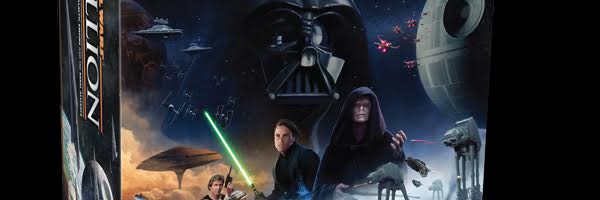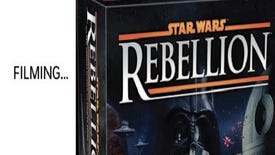Cardboard Children: Star Wars Rebellion Part Two
The best Star Wars game
Hello youse.
Last week I told you how great Star Wars: Rebellion is. Today I dig into why, in a bit more detail. I'll be focusing on a few key elements of the game, and how they work together to tell a thrilling Star Wars story every time you sit down at the table.
STAR WARS: REBELLION
Hey, there's a little official teaser to get you excited. It features actual voices from the actual people out of the actual films. Take a look.
Man, I love Star Wars. And that's the first thing I want to address – do I only love this game because it's Star Wars? Well, no. Naturally, it being a great game that captures the feel of Star Wars gives it bonus points in my own personal tilt at a score, but even if this was a game based on Firefly I'd still be hugely impressed at what it's bringing to the table. I've also tested the game with a player who hasn't even seen Star Wars, and it was a hit. So that's enough scientific objectivity for me.
See, here's the thing I love best about this game - it's not the game it looks like. You set it up on the table and it looks like one of your standard big 4X conquest and development games. You instinctively build a picture of what you'll be doing in the game – building troops, researching new tech, expanding across the galaxy. But it's not that. Rebellion doesn't so much use Star Wars as the setting for its gameplay as use “galactic conquest board game” as its setting. Because it's really all about those leaders, and the dynamic of how they're used across the span of the game.
Let's talk a little bit about Mon Mothma. She's barely in the film. She hovers around with her tidy hair and looks a bit important. She's clearly a key figure in the Rebellion, because she's all serious-looking and stuff. But you don't really feel her influence in the film's story all that much. You have to fill in the blanks yourself.
In Star Wars: Rebellion, Mon Mothma becomes a lead character, iconic in the same way Obi-Wan and Vader are. Her skills make her a diplomacy powerhouse. She's the one you'll be sending on diplomatic missions to increase Rebel sympathies. She's the negotiator. She's pulling hella strings. As an Imperial player, she's the one you want to lock down and capture. Chewbacca? Fuck Chewbacca. Sure, he's a strong hairy nuisance, a sabotage beast, a pain in the arse. But Mon Mothma is The Danger. In every game I play, she's the one I want to coax into a dangerous situation. She's the early-game leader I want to carbon freeze and ship around the galaxy like a traitorous thermos.
The board game tells its own story, elevating characters from the Star Wars saga from bystanders to protagonists, and it helps the game to breathe its own air.
Deeper into capture now. Capture is a hugely important part of this board game. It is understood, expected in fact, that Rebel leaders will be captured throughout the course of the game. There's even a bonus point available for Rebel players who keep their leaders free from capture, so tricky is that to achieve. Capture opens up huge possibilities for the Imperial player. Cards allow the Empire to interrogate captured leaders, speeding up the search for the rebel base. It's a play that necessitates rescue from the Rebels, and in fact it's pretty much always prudent for the Rebel player to make rescues as soon as possible. And that's as it should be, right? They're the good guys, after all.
The mechanics are designed so that captured leaders become a constant, nagging issue that the Rebels need to resolve, and quick. So good guys are forced to be good guys, and the galaxy is as it should be. There's also the distinct possibility that a Rebel leader can be turned to the Dark Side too, so leaving a leader in the Emperor's clutches for too long is always a mistake.
Bluffing is the Rebel player's friend, and concealment of the Rebel base isn't just about missions and objectives, but also about warfare. As the Imperial player pushes across the galaxy, the Rebel player needs to make sure there is no Stormtrooper footfall on the planet that hides the Rebel base. This calls for a pushback from the Rebels, the creation of a defensive front. But it can't be an obvious one. The Rebel army is comparitively weak, so it can't hope to hold out too long against the Empire's push. A number of small fronts, bluffs and counter-bluffs, obscuring the true location of the base is the only path forward. And this opens up a huge amount of meta-play and intrigue.
In this game, you're never really sure about your opponent's objectives from moment to moment. Rebel troops massing in one sector might suggest a pushback, a defence of the base. But it might also be a distraction, or preparation for the execution of an objective. Maybe they just want to bring a Star Destroyer down. Maybe they're going after the Death Star. Maybe they're not doing anything.
Familiarity with the cards is crucial. Your first plays will be all about the thrill of surprise. You will be excited about the kind of cards you can play, and how they all tie into the larger Star Wars story. Yes, the events of Return of the Jedi can roll out. Luke can take out The Emperor. Yes, the Death Star will destroy planets. It's exciting. But with familiarity comes the true meat of the game, the game of chess. Know what your opponent's usual plays are, who she usually tries to capture first, which missions she normally prioritises, and you'll be in a different game.
Leaders will be held in reserve for bluffs and sneak attacks. Leaders will be sent into missions that never activate. The recruitments will start to surprise you – suddenly Han Solo and Lando and the like are not immediate choices. A broader knowledge of the game creates a deeper knowledge of the true value of characters.
I could talk and talk about Star Wars: Rebellion. I still feel like I've only scratched the surface of it, but we must move on. You can see me playing the game on the BBC show videoGaiden from next week on the BBC iPlayer, or on BBC2 if you live in Scotland.
It's the small things, isn't it? Sometimes with a board game it's just those small things. Like when you're building a Death Star and your opponent is naturally very worried about it. And then you play the card that lets you double your efforts, cracking the whip, making everybody work harder. And the development of that Death Star speeds up. I love little things like that. Little screw-turns.
And then... well, sometimes it's the big things. One of the fuzzy rules questions in the game right now is about whether you can perform planet-specific missions on destroyed planets. Well, I don't think so. I prefer not. Because then the Empire can try to destroy Dagobah before Luke ever even gets the chance to go there and train to be a Jedi. I mean, that's big, right? I like that to be a threat for the Rebel player. I like the SCALE of that potential disaster.
Oh god, this game is good. Genuinely brilliant. I promise I'm done talking about it now.
And watch my show.














